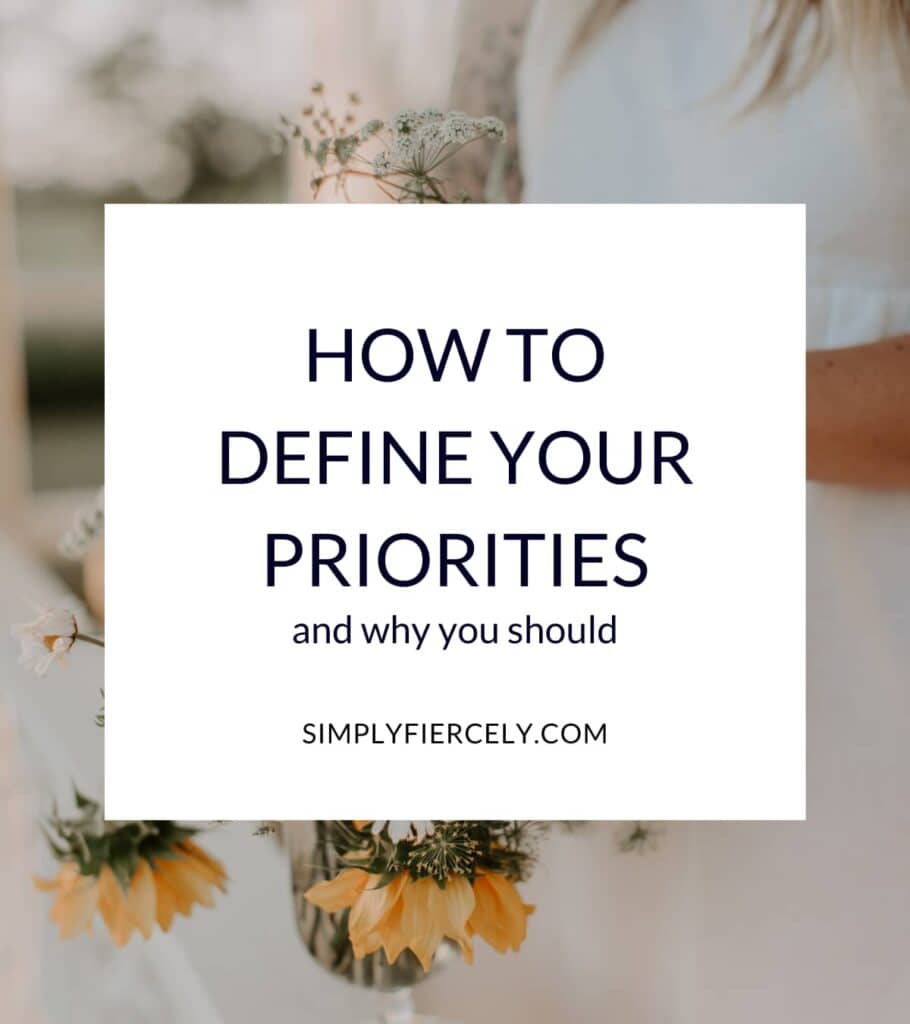Whether it’s work, family, or self-care, every day is a juggle to balance my priorities in life. Yes, it’s a challenge (and I’m sure you can relate) but do you know what’s even harder?
Not knowing what your priorities are at all.
I should know. It took me a long time to stop, take stock and act on what really matters in my life. Before that, I felt pulled in all directions. I was so busy working to do everything, desperately trying to be “successful” by other people’s standards. It left me close to burnout, broke, and unhappy.
Don’t get me wrong: every day is still a balancing act. There are bills to pay and children to feed—but instead of chasing everything, I’ve learned that I can make purposeful choices about what to juggle.
It’s the difference between intentional living and merely existing on auto-pilot. Instead of an arbitrary (and endless) to-do list, you prioritise the things that matter most to you. Life becomes more meaningful, more focused and even more enjoyable. It’s a simple but significant shift, and it all starts with setting aside time to define your priorities.

What Are Life Priorities?
Priorities are a hierarchy that applies to tasks, activities, and even goals. You’ve probably set work priorities to get through a long to-do list or a big project. Usually, in the office, the order of importance is defined by a pressing deadline or costs. They’re helpful to manage time, work efficiently, keep projects moving, and to maintain focus.
Life priorities work in a similar way, but on a more personal scale. It’s an exercise in big picture thinking about how you want to live.
Some examples of what life priorities can be are good health, spending more time with family, feeling fulfilled at work, allowing time to be creative, having work-life-balance, or spending more quality time with your partner.
Your life priorities will be personal—a unique set of guidelines that will help you decide how you want to spend each day, so you can navigate life with purpose and intention.
Related Post: 21 Journaling Ideas + Prompts For Self-Discovery
Why It’s Important to Define Your Priorities in Life
The importance of clarifying your priorities in life can’t be understated. There’s so much to be gained by having a better understanding of what means most to you. Practically, it will help you to manage your time more meaningfully.
No one functions well in a state of overwhelm. Yet, without setting priorities, we’re allowing anything and everything to take up our time and attention. And we’re placing equal importance to it all.
Setting priorities helps to inform how much time we want to spend on different things. This means that we can be present with what we’re doing, instead of feeling guilty about the billion other things we think we should be doing instead.
Before I clarified my life priorities, my time was spread incredibly thin. I was mindlessly chasing everything—I wanted more money, a better job, a bigger house, an exciting social life—the list was never-ending.
I was working so hard but I wasn’t focused. In the end, it was incredibly demoralising because I invested so much of myself yet it felt like I was getting little in return.
When I started thinking about my priorities (really think about them, and not just assuming) things started to shift. I became more deliberate with my time and energy. I stayed focused, inspired and began to feel fulfilled.
Setting priorities in life is essential because they act as a guide to what is valuable, which we can then use to decide how we spend our time, money, and energy. Priorities empower us with the knowledge of what we need to live life more meaningfully.
What Should Influence Your Life Priorities
Your life priorities should be influenced by what really matters to you. I know this might sound obvious but I know from experience that this is often easier said than done!
In reality, there are many external expectations that weigh heavily on us. You might even feel torn—your heart wants one thing but your head is trying to steer you in another direction. It can be hard to know which voice to follow.
This is why it’s important to know your values. Your values are like a compass, and they help ensure that your outward actions fit with what you truly want and need.
Without knowing what you truly value, you’ll continue in a misguided trajectory. Again, I’ve been there and done that. I’d never taken the time to consciously decide what I really wanted, so I let societal expectations and feelings of instant gratification lead me. For example, I prioritised a stressful job that I hated because it paid for the life I thought I needed to be happy.
I knew I was off-track when I got much of what I wanted, but still felt a sense of emptiness. I wasn’t happy and I didn’t feel successful because what I had on the outside wasn’t a reflection of what I wanted on the inside.
So I set out to discover my values by reflecting on my life, and I realised that freedom was more important than things; learning and flexibility mattered more than a job title, and that creativity and storytelling lit up my soul (hence this blog!).
Now I make choices in alignment with these values (such as living a minimalist lifestyle), and I’ve found the clarity and confidence to write my own rules for life.
Related Post: 4 Practical Steps To Creating An Intentional Life

How to Set Your Priorities
Let me be honest with you: this will take some time and self-reflection. But if you feel like you could use some meaningful focus in your life—it will be well worth it. The best part about the process of setting your priorities is that you’ll get powerful learnings at every step.
In short, don’t be intimidated. There’s no right or wrong way because you’ll be moving forward (and in a direction you choose) regardless.
1. WRITE DOWN YOUR VALUES
One exercise you can do is to picture your ideal life in detail, paying special attention to how you feel in this imagined life.
For example, you might imagine yourself in a beautiful house, but what it is about this beautiful house that you really want? Is it feeling secure and comfortable in a space that feels like home? Or is it the beautiful things that the home is filled with?
If you picture yourself with career success, is it the paycheck or the slick office that makes you feel excited? Or is it the feeling of being proud of your work and achievements?
Picture your ideal life, then reflect on why you have imagined those things. Try and come to a list of values that are based on feelings, rather than the material.
Related Post: 7 Questions to Inspire Intentional Living
2. FIT YOUR VALUES INTO YOUR REALITY
These type of changes don’t happen overnight. It will take some time to adjust, and these shifts need to be based on your current reality.
Once you have your list of values, think about your current situation and decide on how it’s reflective of your priorities. Think about all the domains in your life: relationships, health, career, finances, and spirituality (just to name a few examples).
Is what you do in these domains in line with your values? Use your values to guide what you can stop doing, do less of, or do more of in the future.
Note that a values-led life, guided by your priorities, is NOT about achieving perfection. There will always be hard choices and tradeoffs, but with practice you can become more intentional with your decisions.
3. BE ORGANISED ABOUT THESE CHANGES
Old habits die hard. So give yourself the best chance of making lasting change by writing your new priorities and values into your calendar and to-do lists.
Map out what you need to do and prioritise your time to include it. For example, if health is high on your priority list, make sure that is reflected in your calendar by setting time aside to fit it in.
4. SET LIMITS
Another thing you can do to integrate priorities into your life successfully is to limit the amount of change you commit to. Admittedly, it’s hard to make a change and stay motivated, which is why you should start small.
It’s easy to overestimate how much we can get done in a day, so if you can’t entirely overhaul your calendar (because of a job, for example), integrate your priorities bit-by-bit. If you want to prioritise health, start by committing to 20 minutes of exercise daily, rather than an hour. You can slowly build it up as you find new ways to shift your schedule.
5. CHECK IN
Life is fluid and ever-changing. Set-backs are inevitable. And self-reflection is valuable. This is why it’s essential to take time out to reflect and review any changes you’ve made to ensure that they are still working for you and your values.
Remember, this isn’t a race. Instead, intentional living is the lifelong practice of defining, reflecting, and living by your values and priorities. Slow and steady, every little step counts.
If you’d like to learn more, my course Values + Vision is a deep dive into values-led living. On this journey of self-discovery, you’ll clarify your values and priorities, and then learn how to align your life with what matters most.
Have you thought about what your priorities in life are? What are your tips for putting them into practice? Let us know in the comments below.

